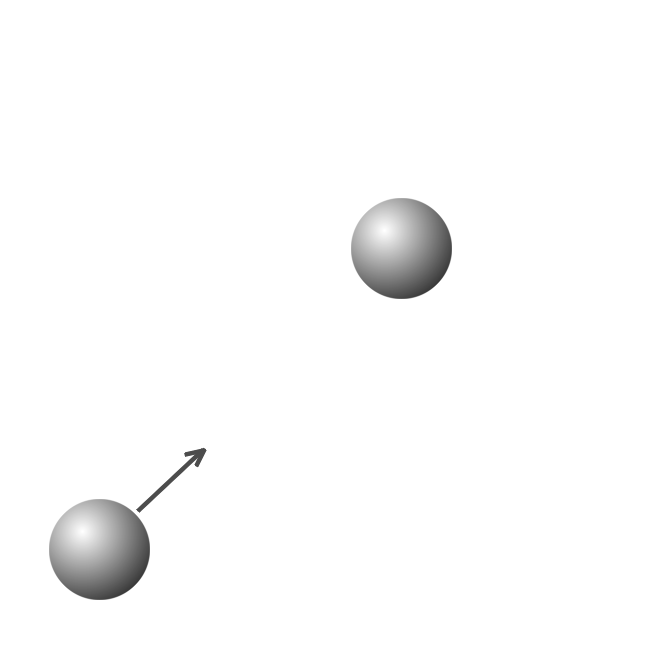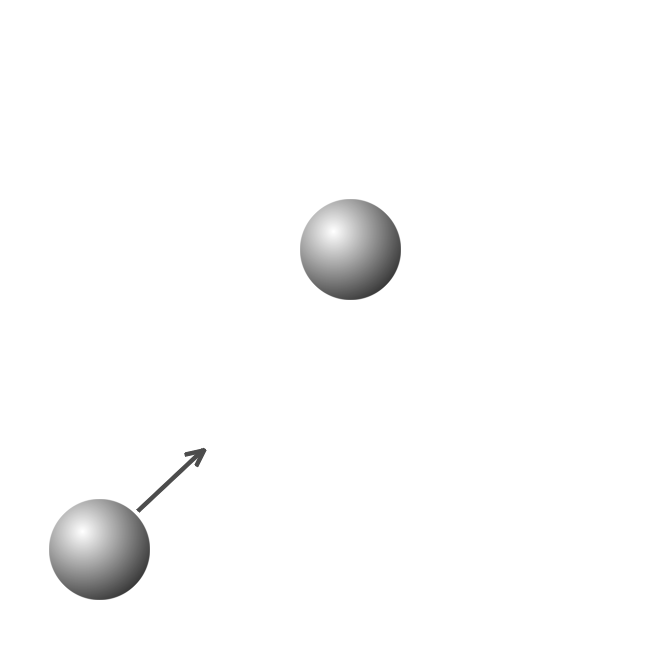Alexander
A.Shpilman ( alexandrshpilman78@gmail.com )
Temporal temperature
If, as in
billiards, a moving sphere collides with a motionless sphere, the movement of spheres
after collision proceeds on the same straight line along which the first sphere
originally moved.

If the
motionless sphere is a little bit displaced from the line of movement of the
first sphere, after collision, the spheres will exhibit a component of movement
along the line of this displacement.

If
all molecules of air absolutely precisely are in current "now", they
will not collide among themselves. All of them remain in our three-dimensional
"now". But if in air there are the molecules hardly outstripping or
late in time from our "now", collisions of molecules due to their
usual thermal movement will result in a certain average energetic conformity,
called the temperature of the air and it temporal temperature (a trembling of
the relative "now"). I.e. the pulse-moment of molecules of air along the
coordinates of time, will change.
Let's
try to estimate possible{probable} size of a deviation{rejection} of atoms from
current "now". For a basis we shall take the idea stated in "De Broglie's Waves in OVERTIME". We see that the energy of a
photon is:
W = h*c/λ
|
where |
h - Planck constant, |
It
is possible to assume that λ - is a width of a potential hole of our "now". And energy of
a photon with this length of a wave, is its depth of "immersing" in
"a black gravitational hole" in our "now" as the photon
cannot escape. It is abandoned, not having the energy up to escape.
Also
concerning electrons and protons:
W = m*c2 = h*c/λ
For the
displacement of a particle in time, for its size λ, (for a proton λ = 10-15) it is necessary to spend
energy equivalent to half of its weight (for proton W/2 ~ 500 MeV). So by
heating air we cannot appreciablly shift an air molecule in time, but the
temporal temperature of matter can be a good accumulator of thermal energy. It
remains to learn how to operate the translation of thermal energy into time,
backwards and forwards.
Probably
in a gravitational hole "now", it is possible at small power inputs,
to cause the stay of a particle in a potential hole of "now". It is
enough to change the resonant phenomenon of the spectrum of self-oscillations
(from the quantum mechanics of waves) of particles.
It is
possible to assume that for "splitting-out" atoms from our
"now", to use their collisions with atoms obviously already having
another pulse of movement in time - with atoms in DS a condition more
effectively (DSS elements, see Time - Overtime
(N1/01)). It is possible to accelerate ionic beams in accelerators and to
direct to a region with has a raised concentration of DSS elements. The
concentration of the latter in vacuum is usually much less than in hard bodies.
Therefore, this method will be ineffective. Taking into account the weak
interaction of DSS elements with normal matter, it is possible to try to
accelerate them directly into hard bodies. For example, to make similarity of a
synchrophasotron of a continuous dielectric ring (the vacuum necessary for
accelerate of ions of atoms will be excessive). But for designing such device
it is necessary to take into account physical features of DSS elements and the
general properties of matter in overtime.
It
is possible to assume, that somewhere in the universe already there is a matter
with high temporal in temperature. But how it to find out? Blurred in
time, probably, it will be difficult for finding out in ours "now".
Probably, it already is around of us in quantity sufficient for increase temporal temperatures
of our habitual subjects so, that they I can leave our gravitational hole
"now" and will go to free travel to time. It are necessary only to
learn to carry out directed temporal heat exchange. Who knows
…